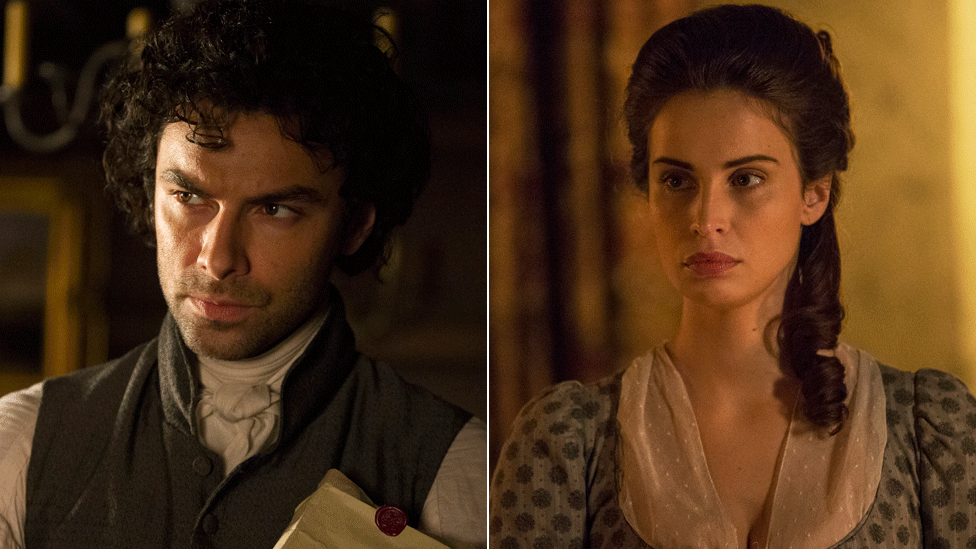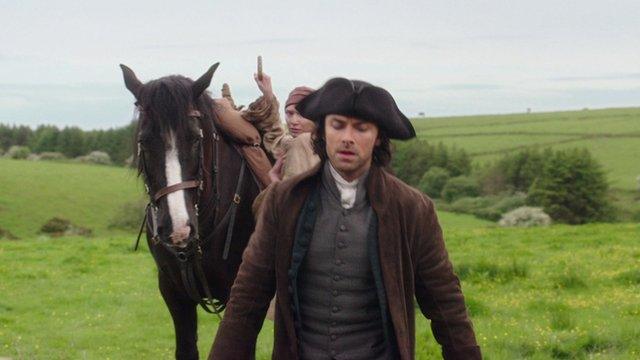Poldark 'rape' scene sparks controversy
- Published
WARNING: THIS STORY CONTAINS SPOILERS

Andrew Graham said there was 'unfinished business emotionally'.
An apparent rape scene in Poldark has been criticised over its "appalling message" by a charity, but defended by the son of Poldark's author.
In BBC One's Sunday episode, Poldark pushed Elizabeth onto a bed after she rejected his forceful advances.
Sarah Green, co-director at charity End Violence Against Women, said: "It is a really appalling message.
"They have made the representation of non-consensual sex ambiguous by making her appear to change her mind."
But Andrew Graham, the son of Poldark novelist Winston Graham, who was a consultant on the BBC's current screen adaptation, said: "There is no 'shock rape' storyline in the novels.
"To say so is to misconstrue my father's text. The BBC has cut nothing and Mammoth Screen's portrayal of these scenes is entirely true to my father's writing."
The BBC had received 17 complaints about the scene at the time of writing.
Media regulator Ofcom has received seven complaints, which will be assessed before a decision is made about whether to launch an investigation.

A third series of Poldark will air on the BBC next year.
In the scene, Poldark - played by Aidan Turner - burst into the bedroom of his former fiancee Elizabeth, played by Heida Reed, and demanded she cancel her wedding to his enemy, George Warleggan.
She ordered him to leave but he forcefully kissed her twice despite her trying to push him away.
He then looked pointedly at the bed before Elizabeth said: "You will not dare. You will not dare."
He replied: "I would Elizabeth. I would and so will you," before pushing her onto the bed where she appears to finally consent.
'Non-verbal signs'
Ms Green said: "It is definitely portrayed very much as a rape.
"The female character says 'no' and there are also non-verbal signs. She is moving away from him and pulling away from him. There is lots of stuff that is ambiguous."
Asked why she thought the character Elizabeth was seen appearing to change her mind, she said: "The problem the producers have found, because this character (Poldark) is extremely popular, they can't represent him as that, they can't represent him as doing something criminal."
But Mr Graham said: "The point of departure for the relevant scene is indeed consistent with the potential for rape.
"But what then actually happens is not described but is left entirely to one's imagination.
"The only way to judge what my father intended is to read the novels as a whole. Doing so it becomes clear, from earlier scenes as well as from Elizabeth's immediate reactions and later mixed emotions, that what finally happened was consensual sex born of long-term love and longing.
"It was, as Aidan Turner has put it, 'unfinished business emotionally'."
Poldark screenwriter Debbie Horsfield said: "One of the first things you learn when you're adapting a novel is that no two readers imagine a scene the same way. This is even more acute when a scene ends abruptly, as is the case in book three, chapter six of Warleggan, when the action cuts out and the rest is left entirely to the reader's imagination.
"However, as programme makers, we needed to decide what the audience would actually see. And, as far as possible, to bring to life what the original author intended the scene to depict.
"We were fortunate to have Winston Graham's son Andrew as our consultant on the series so we were able to clarify with him what his father's intentions for this scene were. What you saw on screen is consistent with what we believe those intentions to have been."
Earlier this year, Turner told the Sun that the controversial scene "seems consensual".
"He goes to talk, [not] to commit a crime," the actor said.

Follow us on Twitter @BBCNewsEnts, external, on Instagram, external, or if you have a story suggestion email entertainment.news@bbc.co.uk, external.
- Published3 August 2016

- Published6 July 2016

- Published4 March 2015

- Published5 September 2016
